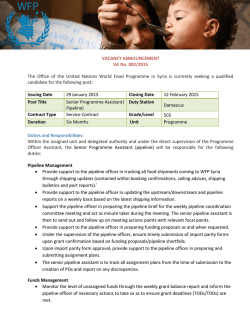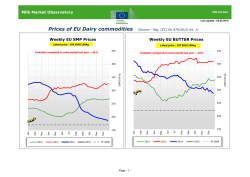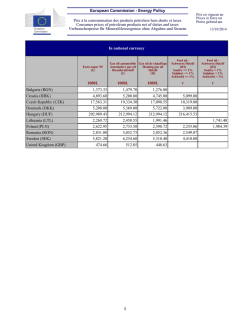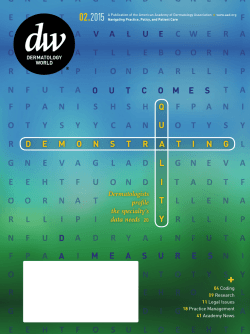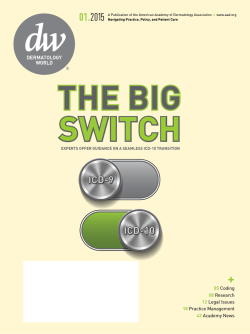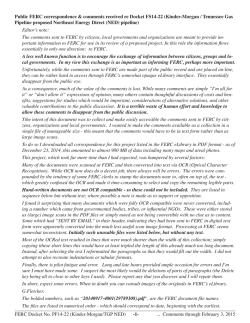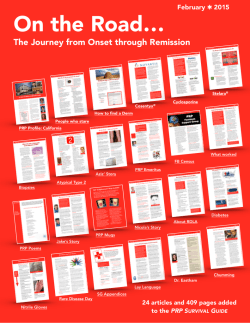
Dermatology pipeline – CB-03-01 (Acne)
R&D Investor Day Lainate January 30, 2015 1 Safe Harbour This presentation may include forward-looking statements that are based on our management’s beliefs and assumptions and on information currently available to our management. The inclusion of forward-looking statements should not be regarded as a representation by Cosmo that any of its plans will be achieved. Actual results may differ materially from those set forth in this presentation due to the risks and uncertainties inherent in Cosmo’s ability to develop and expand its business, successfully complete development of its current product candidates and current and future collaborations for the development and commercialisation of its product candidates and reduce costs (including staff costs), the market for drugs to treat IBD diseases, Cosmo’s anticipated future revenues, capital expenditures and financial resources and other similar statements, may be "forward-looking" and as such involve risks and uncertainties and risks related to the collaboration between Partners and Cosmo, including the potential for delays in the development programs for Methylene Blue MMX®, Rifamycin SV MMX®, and CB-03-01. No assurance can be given that the results anticipated in such forward looking statements will occur. Actual events or results may differ materially from Cosmo’s expectations due to factors which include, but are not limited to, increased competition, Cosmo’s ability to finance expansion plans, the results of Cosmo’s research and development activities, the success of Cosmo’s products, regulatory, legislative and judicial developments or changes in market and/or overall economic conditions. Cosmo assumes no responsibility to update forward-looking statements or to adapt them to future events or developments. You are cautioned not to place undue reliance on these forward-looking statements, which speak only as of the date hereof, and Cosmo undertakes no obligation to revise or update this presentation. 2 Cosmo at a glance: 2013 – E 2014 EUR/Million Traditional contract manufacturing and other revenue MMX® products, manufacturing MMX® products, royalties MMX® licence fees, up-front fees and milestones TOTAL OPERATING REVENUES 2013 11 20 20 5 56 E 2014 12 30 23 18 83 +9,1% +50,0% +15,0% +260,0% +48,2% (34) 22 (48) 35 +41,2% +59,1% Depreciation and amortization OPERATING RESULT (9) 13 (9) 26 0,0% +100,0% Sale of "equity for product" stake Salix termination fee Net financial income PROFIT BEFORE TAXES 58 1 72 65 17 3 111 +12,1% +200,0% +54,2% Cash and liquid financial assets Equity Total financial debt Employees (n) 181 220 12 163 182 203 11 179 +0,6% -7,7% -8,3% +9,8% Operating expenses EBITDA 3 Cosmo‘s path to organic growth 1) Expand GI pipeline 2) Expand activities to other therapeutic areas, namely: Endoscopy & Dermatology 3) Willingness for “equity for product” deals 4) Create as much value as possible in-house and enter deals when value maximization and risk reduction can be achieved 4 Two very successful products in the market • Lialda Launch in 2007 First year Sales $ 50 m second year sales $ 140 m 2013 year sales $ 529 m Launch 2013 First year sales $ 66 m second year sales > $ 150 m Patent protection extended from 2020 to 2031 • Uceris 5 Products on the market GI 6 Lialda: market projections Lialda/ Mezavant Cosmo Revenues in EUR m 7 2015 p 2016 p 2017 p 15,7 16,9 17,9 Lialda: litigation update Genericising Lialda is quite challenging • 4 par. IV litigations currently pending (first filed 2010) for counterfeiting/infringement against Zydus/Cadila, Osmotica, Mylan and Watson (now Actavis) • Cosmo/Shire have won in first instance against Watson (now Actavis) as the Court ruled US6,773,720 patent covering Lialda as valid and the ANDA formulation in infringement. Watson appealed, the federal court amended the claim construction order, Cosmo/Shire challenged such order to the Supreme Court, the Supreme Court ordered the lower court to re-examine the order in light of the ruling in the Teva vs. Sandoz case; this will significantly extend the duration of the trial • In the meanwhile, the 30-months stay period has expired but no ANDA filer has yet launched “at risk”, possibly because if subsequently found guilty it would be exposed to triple damages • Furthermore Watson (now Actavis) has seen its ANDA being rejected for lack of bio-equivalence 8 Uceris: market projections Uceris royalties & manufacturing income in EUR m 9 2015 p 2016 p 2017 p 29.9 37.4 43.9 Uceris: Santarus/Salix Add-On Study Features Source CCFA 2014 10 Uceris: Santarus/Salix Add-On Study Achieving histological healing 11 Source CCFA 2014 Uceris: Cosmo’s benefits from Add-On Trial Add-On trial shows that treatment with Uceris in addition to 5-ASA: • is more effective than 5-ASA alone in terms of clinical, endoscopic and hystological remission • allows a much better mucosal healing compared to 5-ASA alone As UC patients are normally first prescribed with 5-ASA and ≥ 40% of them non respond to 5-ASA, in light of the efficacy of the association: • Uceris should be prescribed on an earlier base • switch/upgrade to Uceris (stronger and more effective steroid with no side effects) should be accelerated 12 Uceris: potential espansion beyond UC • • • • • • • • 13 Microscopic Colitis (MC) is an IBD, namely an inflammation of the colon that can be detected only with a microscope MC stems from an abnormal immune-system response to bacteria normally living in the colon MC includes collagenous colitis and lymphocytic colitis, whose symptoms and treatments are similar The most common symptom of MC is chronic, watery, non-bloody diarrhea. Episodes of diarrhea can last for weeks, months, or even years. Budesonide has proven to be the most effective API for the treatment of MC Best dose is 9mg and requires topical delivery in the last part of the Gut Uceris is the perfect candidate for an extension Discussion are ongoing with partners Uceris Patent Protection (2020-2031) FDA Orange Book listing Appl No Prod No N203634 001 N203634 001 N203634 001 N203634 001 N203634 001 N203634 001 14 Patent No Patent Expiration 7410651 Jun 9,2020 7431943 Jun 9,2020 8293273 Jun 9,2020 8784888 Jun 9,2020 8895064 Sep 7,2031 RE43799 Jun 9,2020 Drug Drug Substance Product Claim Claim Y Patent Use Delist Code Requested U - 1325 Y Y Y Y Y U - 1325 Uceris Additional Patent Protection on Pharmacokinetic Parameters (PK) • US Patent 8,895,064 was granted on November 25, 2014 with claims containing the in vivo pharmakinetics parameters related to the product • It is important to have PK parameters granted in a US patent on an already marketed product • US patent ‘064 expiry date in 2031 • This patent is already listed in the FDA Orange Book listing • Two additional child patent applications with PK claims are now pending to strenghten the position (expiry 2031) Uceris is thus now protected also with PK parameters 15 Uceris additional protection against ANDA Filers stemming from new Bio-Equivalence (BE) Guidance • In response to the Citizen Petition filed by Santarus/Cosmo (2013), FDA issued a BE Draft Guidance specific for Uceris (December 2014), requesting two in vivo (pharmacokinetics) and one in vitro testing parameters (dissolution) • ANDA Filers must therefore show bioequivalence with the following testing parameters: In vivo : both fast and fed conditions - partial AUC8-48 (with at least 4 non-zero points for each part); - AUC0-t (last time point at least at 72 hours), and - Cmax In vitro : dissolution at 6 different pHs (at least 12 tbs per test) - 4.5 (acetate buffer at 100 rpm); - 6.9, 6.5, 6.8, 7.2 ad 7.5 (phosphate buffer at 100 rpm); - alcohol and non-alcohol method (methods to be presented in detail) • FDA requests 90% Confidence Interval (CI) for each parameter As seen with Watson in the case of Lialda, genericizing Uceris will be a challenging proposition from the BE standpoint 16 Cortiment • Cortiment was successfully launched in The Netherlands in 2013. Market dynamics (units/inhabitants) equal to US • Approval extended in 27 EU countries with MRP concluded in October 2014 • Launch sequence on the basis of National approvals and of price optimization, starting from Q1 2015 • Product presentation at 2015 ECCO in a dedicated satellite symposium 17 Cortiment: RoW approval path Cortiment marketing authorization application (MAA) already submitted in : • Australia • Israel/Jordan/Kuwait/Lebanon • Brazil • South Africa • Russia • Mexico Submissions in CH, Turkey, UAE, Chile, Canada to follow 18 Expected approvals in 2015: • Australia • Israel/Lebanon • Jordan/Kuwait • Russia • Mexico Cortiment: market projections Cortiment royalties & manufacturing income in EUR m milestones in EUR m 2015 p 2016 p 2017 p 0.7 2.3 5.5 1 • As per units sold, the forecast is in line with US’ (after 3 years from launch, ~12m tablets sold for each of Cortiment and Uceris) 19 ZACOL NMX • Jan-Apr: 3 weeks TV and 3 months radio advertising, highly successful • 90’000 packs sold in the market in the ads period • test confirmed the market need of products to regulate intestinal functions in healthy subjects Next steps: • classification of Zacol as a medical device (ZacolMed) • export model in EU/US with selected commercial partners 20 Products under development GI Pipeline 21 GI Pipeline - Rifamycin NCE (in US) antibiotic with negligible absorption after oral administration and lower possibility of resistance. Candidate for 10 years exclusivity in USA under GAIN Act Indication currently sought: Travellers’ Diarrhoea Clinical status: Two pivotal clinical trials were required to support registration: 1 – US trial (superiority vs. placebo) completed successfully in LatAm 2 – EU trial (non inferiority vs. Cypro) ongoing Trial begun in India by Falk. After 800 patients, due to unexpected local regulatory issues affecting all clinical trials the trial was put on hold. Falk has now moved the trial in LatAm (Mexico, Perù, Guatemala and Ecuador) Development Timeline: NDA filing set for 1Q 2016 22 GI Pipeline - Rifamycin subsequent indications Uncomplicated Diverticulitis • Phase II managed by Falk in Germany, Italy, Hungary and Romania. • approximately 100 patients enrolled. • expansion to other two countries ongoing. Development timeline: interim analysis by end of 2015 IBS • New formulation containing 600mg/tablet already developed aiming at better patients compliance • Seeking an earlier API delivery in the small intestine and colon Development Timeline: Phase I/II to start in 1Q 15 23 GI Pipeline - MoAb MMX Target: to deliver MoAb topically in the intestine, in order to avoid toxicity associated with their systemic absorption and reduce immunoreactions Potential indication: Ulcerative Colitis (maintenance of remission), as an ideal follow-up to Uceris-Cortiment/Lialda Evidence: • Proven preservation of chemical structure of MoAb in MMX tablets and functional activity maintained in colonic environment • Successful efficacy model in mice • Infliximab Bio-better under scale up process • Phase I/II trial planned to start in 2015 24 GI Pipeline - MoAb MMX The colon does not host proteolytic enzymes that may destroy MoAbs * 25 From “METABOLISM” – compiled and edited by Phlip L.Altman and Dorothy S. Dittmer Federation of Amer. Soc. for Exp. Biology GI Pipeline - MoAb MMX MMX® manufacturing process does not degrade or change the structural conformation of MoAbs Tablets manufactured with MMX® technology maintain the antibody binding capacity GI Pipeline - MoAb MMX Infliximab extracted from tablets manufactured with MMX® technology maintains the antibody biologic activity LNCaP TNFa-induced cell death inhibited by anti-TNFa 2,E+05 2,E+05 Relative Cell Number 2,E+05 1,E+05 1,E+05 1,E+05 z 8,E+04 6,E+04 MMX-48 MMX-49 Inflix no TNF 4,E+04 2,E+04 0,E+00 0,01 0,10 1,00 M olar Excess Antibody over TNFa 10,00 100,00 GI Pipeline - MoAb MMX Infliximab locally delivered in DNB colitis is effective Infliximab 0.008 mg/die Intracolon treatment Daily dose (mg/die) Colon weight (g) Mucosal Damage Area (mm2) * Inhibition (%) P --- 1.81 ± 0.76 262 ± 209 --- --- Infliximab 0.008 1.62 ± 0.31 88 ± 80 66.73 0.032 Infliximab 5.0 1.76 ± 0.39 181 ± 143 30.63 0.394 Vehicle 28 Vehicle * digital evaluation GI Pipeline - MoAb MMX Administration of an anti-TNFα soluble receptor into the colonic lumen is effective in reducing the necrosis area in the treated mice % of inhibition vs baseline 70 58,4 60 49,2 50 48,6 40 30 20 18,7 10 2,24 0 0,0008 0,002 0,008 0,04 0,08 -10 daily topical dose mg -5,5 0,80 GI Pipeline - MoAb MMX Interferon MMX tablets match MMX dissolution standards t=0h t=4h t=8h t = 12 h GI Pipeline - MoAb MMX Study Aim: show clinical efficacy of topical delivery of MoAb in the intestine Treatment Regimen Infliximab 100 mg/100mL administered as enemas. Three enemas one week apart, on days 0, 7, and 14. Study Duration 42 days Subjects characteristics Four patients presenting with active left-sided ulcerative colitis of moderate severity, with a Clinical Activity Index (CAI) >6 <10 Observation time Clinical remission (CAI score<4) at 6 weeks of observation Results Two subjects completed the study as per protocol. CAI remission (score<4) was observed in both subjects at day 7, and was maintained/ improved up to day 42. GI Pipeline - MoAb MMX Assessment and assumptions for MMX® application 1- Protein and peptide degrading proteolytic enzymes or peptidases are less abundant in the colon than in the upper GI tract 2 - Drug delivery into the colonic region, also in the left side of it, through MMX® tablets is validated 3- MMX® formulation auxiliary substances are compatible with the chemical nature of peptides and proteins: no compatibility major problems 4- MMX® manufacturing process thermic and mechanical stresses do not degrade or change the structural conformation of proteins or peptides 5- Proteins delivered by MMX® tablets have been proven to retain their binding capacity and their peculiar biologic activities GI Pipeline - MoAb MMX Development timeline: 33 • Formulation and analytical development ongoing with model APIs • Generation by AIMM of a series of stable Remicade bio-better clones • AIMM bio-better with physico-chemical and biological properties similar to Remicade (before and after lyophilization) • Selected clone has been transferred to a protein mfrg company for large scale production • Batches available for MMX manufacturing by end of Q2 2015 Products under development Endoscopy Pipeline 34 Endoscopy Pipeline Two new powerful tools to support endoscopists in their battle against colon cancer Methylene Blue MMX® 35 SIC 8000 Endoscopy Pipeline - Methylene Blue MMX (MB) Methylene Blue is used in > 10% colonoscopies via “in situ” spraying onto the colonic mucosa Suspicious area according to endoscopist survey 2-3 fold increased procedure time* [~80$ cost of single use spray catheter] Localized and partial staining* *ASGE Volume 66, No 4: 2007 GASTROENINTESINAL ENDOSCOPY. 36 Clinical Trial showed increased detection rate with Indigo Carmine. Increased Detection Rate in the area* 37 Endoscopy Pipeline - MB MB: a revolutionary diagnostic tool for early cancer detection Normal Procedure Time * According to Phase II Clinical Data, 51% more polyps and 47% more adenomas were found with MB 38 Whole Colon stained, overcoming operator subjectivity Sharp increase in Detection Rate, especially for flat/small lesions* 39 MB Main Target Polyps not otherwise visible MB Main Target Polyps not otherwise visible INVISIBLE WITHOUT MB Endoscopy Pipeline - MB development timeline • Phase III ongoing, expanded from 13 sites between US and EU to 20 • Primary endpoint: proportion of subjects with at least one histologically proven adenoma or carcinoma vs. white light endoscopy • 1,270 patients to be treated within H1 2015 • Data available Q3 2015 • Centralized Registration Application granted in EU under EMA • Special Protocol Assessment (SPA) granted by FDA 43 310 330 431 Dr. Alessandro Repici, Istituto Clinico Humanitas Rozzano, Italy Dr. Renato Cannizzaro, Centro di Riferimento Oncologico Aviano, Italy Dr. Ralph Kiesslich, Klinikum der Landeshauptstadt Wiesbaden und der HELIOS Kliniken Gruppe Drittmittelverwaltung Wiesbaden, Germany 510 Dr. James East, John Radcliffe Hospital Oxford, UK 610 Dr. Evelien Dekker, AMC Amsterdam Amsterdam, Netherlands 611 Dr. Peter D. Siersema, UMC Utrecht Utercht, Netherlands 630 Dr. Manon Spaander, Erasmus Medical Centre, Rotterdam, Netherlands 730 Dr. Limas Kupcinskas, Kaunas University of Medicine, Kaunas, Lithuania 820 44 MB Phase III Clinical Trial Sites: EU Dr. Raf Bisschops, Belgium University Hospital, Leuven, Belgium 730 610 510 611 630 820 431 310 330 45 130 Dr. Michael Wallace Mayo Clinic Jacksonville, FL 131 Dr. Prateek Sharma University of Kansas School of Medicine, Kansas City, MO 110 Dr. Francisco Ramirez Mayo Clinic, Scottsdale, AZ 111 Prof David Bruining Mayo Clinic, Rochester, MN 114 Dr David Gatof, Clinical Research of the Rockies Lafayette, CO 132 Dr. Marcia (Mimi) Canto J Hopkins, Baltimore, MD 230 Dr. Norman Marcon, St. Michael's Hospital Toronto, Canada MB Phase III Clinical Trial Sites: North America 111 112 230 132 131 110 130 Endoscopy Pipeline MB market potential estimate MB Market potential non SSRI colonoscopies in US in m 46 2017 2018 2019 2020 2021 12.6 12.8 12.9 13.1 13.2 market penetration 5% 10% 15% 20% 20% minimum price 120 120 120 120 120 colonoscopies in EU 17.4 17.6 17.8 18.0 18.3 market penetration 5% 10% 15% 20% 20% minimum price 50 50 50 50 50 colonoscopies in RoW 24.8 26.8 29.0 31.5 34.2 market penetration 0% 2,5% 5,0% 7,5% 10,0% minimum price 30 30 30 30 30 total revenues in EUR m 119.1 261.2 409.6 564.8 602.4 Endoscopy Pipeline - SIC After the lesion is found, it must be removed 47 Total time for lesion removal: 40 minutes Endoscopy Pipeline - SIC Polyps removal tecniques Endoscopic Mucosal Resection (EMR) • Most commonly used technique for the removal of mucosal lesions, smaller than 2 cm, or piecemeal removal of larger lesions (> 2 cm) • A cushion is needed to lift the lesion and facilitate its removal, minimizing the risks of mechanical or electrocutlery damage to the deep layers of the GI wall Injection in the submucosa 48 Capture with the snare Removal Endoscopy Pipeline – SIC Polyps removal tecniques Endoscopic Submucosal Dissection (ESD) • Developed specifically for removing larger lesions (> 2 cm) • Predicted to replace conventional surgery • Higher rate of perforation and bleeding complications • Submucosal injection is essential in ESD, and a high and long lasting submucosal cushion is needed for a safe cutting Circumferential injections 49 Mucosal elevation Submucosal dissection Endoscopy Pipeline - SIC • To avoid risk of perforation, particularly for flat polyps, endoscopists need to create a ’’safety cushion‘‘ between the lesion and the deep layers of the GI wall • Current procedures foresee the injection of normal saline solution, which is easy to inject but dissipates quickly • Longer lasting cushions are obtained with expensive Hyaluronic Acid solutions or self made cocktails • Strong need to obtain similar long lasting effect with alternative solutions: ideal product should: • have low viscosity to facilitate injection • Provide a long lasting cushion (> 30 min) • Include a dye to enhance borders definition • be safe and bio-compatible • Affordable in terms of pricing 50 Endoscopy Pipeline - SIC • SIC 8000 (SIC) is a Submucosal Injectable Composition, easy to be injected, developed to be used in endoscopic resection procedures in the GI tract • SIC creates a long lasting cushion which is essential for a successful Endoscopic Mucosal Resection (EMR) or Endoscopic Submucosal Dissection (ESD) • SIC is dyed with methylene blue, so it helps in visualizing the lesion and performing the resection procedure, minimizing risk of perforation • SIC is covered by two international and one US patent applications filed in 2014 (priority 2013) 51 Endoscopy Pipeline - SIC SIC satisfies an unmet need • No products for this indication currently available in the US market • Most commonly used submucosal injectable solution is normal saline, but several injections needed to maintain the cushion • Hyaluronic acid solutions are known to be long lasting, but expensive Sigmavisc® in EU costs 50€ for 5 ml, Muco-up® in Japan costs 55€ for 5 ml • Other patented compositions not on US market for impracticality • Easy to use: no additional or customized devices (such as syringe pumps or other pumps) needed to administer SIC 8000 No currently used solutions meet medical needs in endoscopic practice 52 Endoscopy Pipeline – SIC Practical application 53 Endoscopy Pipeline – SIC Practical application 54 Endoscopy Pipeline – SIC Practical application 55 Endoscopy Pipeline – SIC Development as agreed with FDA is completed • 3 biocompatibility studies (as per ISO 10993 standard) In vitro cytotoxicity Acute intracutaneous reactivity study in rabbits Delayed dermal sensitization in guinea pigs Biocompatibility studies demonstrated that SIC 8000 is biocompatible: not cytotoxic, not irritating, not sensitizing • 5 preclinical GLP studies on animals: Tolerability study in minipigs Tolerability study in dogs Tolerability study in pigs EMR/ESD procedures using SIC 8000 in pigs (stomach + colon) Feasibility study of EMR/ESD procedures in pigs (stomach + colon + esophagus) • Aim of the preclinical studies: full characterization of the product (efficacy/safety profile) in conditions simulating and mimicking the actual use of the product on human patients • Animal species selection based on the animal models currently used for endoscopic training procedures 56 Endoscopy Pipeline - SIC Development Timeline SIC is a medical device classified as a class II medical device in US and as either a class IIa or IIb medical device in EU Approval timeline: • 510(k) filing in US scheduled by end Q1 2015 • FDA approval scheduled by end Q2 2015 • European CE mark filing scheduled by Q2 2015 • European approval scheduled by Q4 2015 57 Endoscopy pipeline: SIC market potential estimate (colonoscopies only) SIC market estimates polyps/adenomas per colonoscopy in phase II % of polyps/ adenomas removal requiring SIC Minimum vials per colonoscopy 58 2016 2017 2018 2019 2020 1,75 1,75 1,75 1,75 1,75 20% 20% 20% 20% 20% 1,5 1,5 1,5 1,5 1,5 estimated price in US 100 100 100 100 100 market penetration in US 10% 20% 30% 40% 50% estimated price in EU 40 40 40 40 40 market penetration in EU 7% 15% 25% 30% 30% estimated price in RoW 30 30 30 30 30 market penetration 3,5% 7,5% 12,5% 15,0% 15,0% Revenue (millions) 68,5 143,1 227,8 298,6 353,6 Endoscopy pipeline: SIC market potential (additional indications) The tissues of the esophagus, stomach and duodenum are quite similar to those of the colon. Inspection of these three tracts is conducted by Esophagogastroduodenoscopy (ECG). SIC can be used in all these tracts. As many ECGs are performed as colonoscopies, both in the US and Europe. During ECG, removal of tissues/polyps is frequently necessary and will require SIC as per below examples: Barrett Esophagus • Caused by GERD, ~ 1,6% of population affected • Requires an ECG every 3 years • Tissue removal required in ~ 10% all cases Stomach & duodenal polyps • polyps requiring extraction are found in around 0,7% of all procedures 59 Endoscopy Pipeline – SIC Additional Indications - Stomach 60 Endoscopy Pipeline – SIC Additional Indications - Esophagus 61 Products under development Dermatology Pipeline 62 Dermatology pipeline Product CB-03-01 ACNE CB-03-01 ALOPECIA CB-06-02 AS 101 CB-06-04 ACNE ANTIBIOTIC Pre-clinical Phase I Phase II Phase III MA Launch Dermatology: a market with little innovation and many opportunities • No NCE in Acne in the US market in the last 15 years • Dermatologists generally prescribe 2-3 products at the same time as they look for new therapeutic options • Historically dermatology has had the lowest product failure rate in clinical trials • Probability of success in phase III clinical trials is high • Market has important cosmetic and life-style implications 64 Dermatology Pipeline Acne market dynamics & opportunity 85% of all persons age 12-24 get acne, characterized as a chronic disease In US 17 m person have acne, 35 m prescriptions are written p.a. primarily generics as there are no new drugs WW market ~ $ 3 b; US Market at $ 2.3 b, growing by ~ 1% p.a. • Topical antibiotics market share ~ 29% • Topical retinoid market ~ 25% • Oral antibiotic market ~ 41% Excellent opportunity for new topical drugs with novel treatment forms and very low side effects 65 Dermatology pipeline – CB-03-01 (Acne) CB-03-01 (Cortexolone 17α-propionate) is a NCE with a new mechanism of action, acting on the sebum secretion control. It can prevent the cascade of physiological events: follicle closure by sebum overproduction -> colonization by Prop. acnes -> Inflammation that leads to Acne formation, through evidence of Comedones -> papules -> pustules -> nodules -> cysts Differently from other Acne drugs, CB-03-01 is topically effective without systemic side effects (no relevant AEs detected on the >450 subjects treated up today) 66 Dermatology pipeline – CB-03-01 (Acne) Phase II overview Phase II dose ranging trial completed in US 360 patients – 4 doses + vehicle Best dose identified (1% BID) No adverse events 67 Dermatology pipeline – CB-03-01 (Acne) Phase II overview • • • • • • • • 68 CB-03-01 is a NCE FDA requires at least 1000 patients treated for safety evaluation 110 patients treated in Phase I/IIa 290 patients treated in Phase IIb Primary Endpoints: reached 700 treated patients planned for Phase III (2 pivotal studies of 350 vs vehicle) CB-03-01 has shown statistical significance in Phase II with only 72 patient per cohort CB-03-01 has therefore very high potential for showing statistical superiority vs vehicle Dermatology pipeline – CB-03-01 (Acne) Phase II overview statistical significance in IGA improvement (co-primary endpoint) BID 1.0% cream VEHICLE % % 2-Point Improvement 17.1% 6.7% No Change 35.7% 61.3% % % 2-Point Improvement 21.8% 8.5% No Change 23.6% 59.3% ITT PP 69 P value 0,0321 Dermatology pipeline – CB-03-01 (Acne) Phase II overview CB–03–01 Phase II: statistical significance in total lesion count (co-primary endpoint) CB-03-01 1% cream VEHICLE P-value -13.1% 0.0173 BID ITT MEAN 70 -35.7% Dermatology pipeline – CB-03-01 (Acne) Phase II overview successful also in secondary endpoint showing reduction in Inflammatory Lesion Counts ITT MEAN * Kruskal Wallis test 71 CB-03-01 1% cream BID VEHICLE % % -37.2% -27.0% P-value* 0.0384 Dermatology pipeline – CB-03-01 (Acne) Phase II overview successful also in secondary endpoint showing reduction in Non-Inflammatory Lesion Counts CB-03-01 1% cream VEHICLE P-value -16.1% 0.0178 BID ITT MEAN 72 -32.9% Dermatology pipeline – CB-03-01 (Acne) Development timeline • EOP2 achieved on Jan 28th • Special Protocol Assessment to be discussed with FDA in Q2 2015 • Phase III trials program: - 2 pivotal trials (US + EU) with > 700 patients/each FPI in Q3 15 - 1 extension trial - data available Q3 17 73 LPO in Q1 17 Dermatology Pipeline Alopecia market dynamics & opportunity 20% of all men and 10% of all women between 20-64 lose part of their hair ~ 17% of persons affected use at least one substance • <1% of affected men and women have done hair transplants • <1% of affected men and 5% of affected women use hairpieces US Market estimated at $ 1 b and EU market at EUR 1.5 b, growing by ~ 2% p.a. • Rogaine and Propecia are only approved products in both markets • Patents for both products have lapsed Excellent opportunity for new topical drugs with novel treatment forms and very low side effects 74 Dermatology Pipeline – CB-03-01 (Alopecia) Dermatology Pipeline – CB-03-01 (Alopecia) Rinaldi 2010 - International Hair Research Foundation (IHRF) 76 Dermatology Pipeline – CB-03-01 (Alopecia) Rinaldi 2010 - International Hair Research Foundation (IHRF) 77 Dermatology Pipeline – CB-03-01 (Alopecia) Rinaldi 2010 - International Hair Research Foundation (IHRF) 78 Dermatology Pipeline – CB-03-01 (Alopecia) Rinaldi 2010 - International Hair Research Foundation (IHRF) 79 Dermatology Pipeline – CB-03-01 (Alopecia) • Only topical anti-androgen for treatment of Androgenetic Alopecia (Propecia® is a tablet) • Kinetic proof of scalp penetration obtained • Same mechanism and safety as for acne 80 Dermatology Pipeline – CB-03-01 (Alopecia) Development timeline • POC Phase II ongoing in USA: 90 patients, double blind, 3 parallel arms, placebo and Minoxidil controlled, 26 weeks of treatment, endpoints on scalp darkness and patient satisfaction. • The Modified Norwood-Hamilton Scale is used to assess the eligibility of subjects at the Screening Visit. Subject has to have mild to moderate AGA in temple and vertex region rating Modified Hamilton-Norwood Scale III vertex to V (IIIv, IV, V) with ongoing hair loss to be eligible for this study • Recruitment is in progress and treatment will be completed by end of 2015 81 Dermatology Pipeline – CB-06-02 (HPV) market dynamics & opportunity >20 m persons are infected with HPV in the US, around 1% of sexually active persons in US have visible external genital warts (AGW) HPV can lead to cancer and should be eradicated In western countries many young children are vaccinated against the Papillomavirus • the vaccine is ineffective on persons that already have the virus Current market • around 360’000 persons develop AGW each year in US • there are ~ 600’000 TRX each year • main products prescribed are Imiquimod based 82 Dermatology Pipeline – CB-06-02 (HPV) • Anogenital warts (AGWs) is a common, highly infectious disease caused by the human papillomavirus (HPV) • Tellurium based compound for treatment of HPV and genital warts • HPV vaccination is currently in regression because of fertility concerns 83 Dermatology Pipeline – CB-06-02 (HPV) American family Physician December 15, 2004, 70 (12) 84 Dermatology Pipeline – CB-06-02 (HPV) Development timeline • POC Phase II ongoing in Israel on 30 + 30 patients, double blind, parallel arms, 12 weeks of treatment + 3 months of follow up, endpoints on remission and recurrence rates • Trial Completion foreseen by Q1 2016 85 Dermatology Pipeline – CB-06-01 (Acne) • Topical antibiotic for the treatment of Acne • Ideal complement to CB-03-01 • NCE with very potent and selective properties • Effective with bacterial strains resistant to other antibiotics 86 Dermatology Pipeline – CB-06-01 (Acne) Antibacterial spectrum 87 Dermatology Pipeline – CB-06-01 (Acne) Activity against antibiotic-resistant P. acnes 88 Dermatology Pipeline – CB-06-01 (Acne) Development timeline • POC Phase II ongoing with a gel formulation, completion by Q1 2016 89 Cosmo Corporate Matters 90 Cosmo Corporate Matters No impact of FX turmoil on Cosmo No costs in CHF Only 9% of costs in $, rest in EUR 49% of revenues in $; 51% in EUR All liabilities are in EUR 91 Cosmo Corporate Matters Cash & Liquid Investments as of 1/12/2015 EUR 123.6 m USD 63.7 m 92 Cosmo Corporate Matters Financial position 151,5 m investments 35,7 m cash 74% in EUR; 26% in $ 64% in EUR 36% in $ 11 m debt 100% in EUR 93 Cosmo Corporate Matters Completed Capital Reduction • annullment of 576’760 shares • total capital unchanged by increasing nominal value per share from EUR 0.25 to EUR 0.26 • Total shares outstanding now 14’418’983 shares • Accretion of 4% which is an implicit dividend 94 Cosmo Corporate Matters Next Strategic Steps • Change of registered office to Luxembourg • Set-up of second plant in Ireland • Potential strategic spin-off of derma franchise by means of IPO or private placement • Initiate discussion for deals re pipeline products • evaluate possibility of setting up own distribution company in US 95 Cosmo Corporate Matters Transfer of Seat to Luxembourg • Filing for registration in Luxembourg early February • Registration takes place in 10-20 days • After registration in Luxembourg, filing for cancellation in Italy 96 Cosmo Corporate Matters Consequences of shareholders‘ withdrawal • 104’931 shares put to the company at CHF 156.03 • shareholders who have tendered shares will receive payment value May 5, 2015 • shareholders who did not tender shares have pre-emptive rights to purchase tendered shares at CHF 156.03 until February 13 • no need of a convertible/loan to finance redemption 97 Cosmo Corporate Matters Second Plant in Ireland • a second FDA approved plant is being built in Dublin, Ireland • Scope: • ensure production continuity • enhance manufacturing franchise • grant second line of supply to strategic partners • Plant will occupy a newly constructed “shell” bordering Dublin airport to ease logistics 98 Cosmo Corporate Matters Second Plant in Ireland - Features • 3’000 sqm surface, 12m height • MMX tablets production line (500k batch size) + bottle and blister packaging lines • expected timeline: • Q1 2015 planning permission filing • Q4 2015 fit-out works start, around 12 months duration • H2 2017 FDA inspection • total investment: approx EUR 15m in 2016-2017 99 Cosmo Corporate Matters Potential IPO of Cosmo Derma • Newco is being set up • Newco to be funded by Cosmo Pharma • Plan to list on SIX • Plan to give existing Cosmo Pharma shareholders pre-emptive rights 100 Cosmo Corporate Matters Next Deals Opportunities Endoscopy SIC (w/w rights) MB (w/w) GI Rifamycin (rights in US and selected RoW countries) Monoclonal Antibody MMX (w/w) Dermatology CB-03-01 CB-03-01 CB-06-02 CB-06-01 101 for for for for Acne (w/w) Alopecia (w/w) HPV-Genital Warts (w/w) Acne (w/w) Cosmo Corporate Matters 2015 Projected Clinical News Flow Endoscopy SIC: approval MB: end of phase III GI Rifamycin: end of phase III Dermatology CB-03-01 for Acne: start of phase III CB-03-01 for Alopecia: end of POC – phase II 102 2014 – 2016 Guidance EUR/Million Traditional contract manufacturing and other revenue MMX® products manufacturing MMX® products royalties MMX® licence fees, up-front fees and milestones Revenues from products under development Total Revenues Operating expenses EBITDA Depreciation and amortization Operating result Sale of "equity for product" stake Salix termination fee Net financial income Profit before taxes Potentially replaceable with “equity for product” transactions (1) includes EUR 5.7 M royalties on Lialda/Mezavant: royalty cap reached in 2Q 2014 (2) includes EUR 23,4 M roy on Uceris/Cortiment (3) includes EUR 28,4 M roy on Uceris/Cortiment (4) assumes MB and SIC are licensed in 2015 and Rifamycin is licensed in US in 2016 (5) includes SOP and profit bonus (6) gain on sale of SNTS shares 103 E 2014 E 2015 E 2016 12 30 23 18 12 34 24 12 38 29 1 163 243 (67) 176 (3) 173 (1) (2) - 83 (48) 35 (9) 26 65 17 3 111 (5) 80 150 (54) 96 (9) 87 (4) (5) (6) 3 90 6 179 (3) (4) (5) Cosmo Pharmaceuticals Information Contacts • Number of shares: 14,418,983 • Alessandro Della Cha , CEO [email protected] • Listing: SIX Swiss exchange, Main board • ISIN: IT0004167463 • Chris Tanner, CFO [email protected] ph: +39-02-9333’7276 • Giuseppe Cipriano, COO [email protected] • Luigi Moro, CSO [email protected] 104
© Copyright 2026
